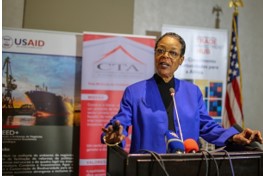Speeches Shim
OVERVIEW
USAID has worked closely for years with partners such as private sector companies and associations, civil society organizations, and the Government of Mozambique to make it easier to do business across sectors, put the country in a stronger competitive position, and increase trade and investment. Recent work has focused on reforming agricultural trade and investment policies with an eye on improving livelihoods of smallholder farmers as well as enabling agribusiness to flourish. The country faces new crises such as currency instability, falling prices of export commodities, inflation, and energy scarcity that hamper business and investment. Leaders and citizens both have also realized the necessity of taking urgent action to protect the nation’s unique biodiversity, that is under enormous threat. Policy reforms to enable business and investment, simplify trade, increase access to energy, and protect wildlife are more important than ever.
PROGRAM DESCRIPTION
SPEED+ provides expert technical services to the Government of Mozambique in support of economic and structural reform in the areas of agriculture, trade, business enabling environment, energy, private sector provision of water, and biodiversity conservation. It also promotes the areas of improved fiscal transparency, tax policy and economic and environmental governance. SPEED+ provides expert technical assistance and training for public sector institutions and civil society organizations at the national and local levels. It supports global initiatives such as Feed the Future, the G8 New Alliance for Food Security and Nutrition, Trade Africa, Power Africa, the USAID Biodiversity Policy, and the President’s Strategy to Combat Wildlife Trafficking.
EXPECTED RESULTS
The program will see specific reforms passed and implemented that successfully change behavior and improve the operating environment. This could be measured by jobs created; number of people affected, cost savings for companies, new investments, increased fees or prosecutions related to wildlife protection, or increased public awareness of wildlife issues.
- Minimum of 3 reforms in agriculture
- Minimum of 4 reforms in trade
- Minimum of 3 reforms in energy and water
- Minimum of 2 reforms in biodiversity


Comment
Make a general inquiry or suggest an improvement.